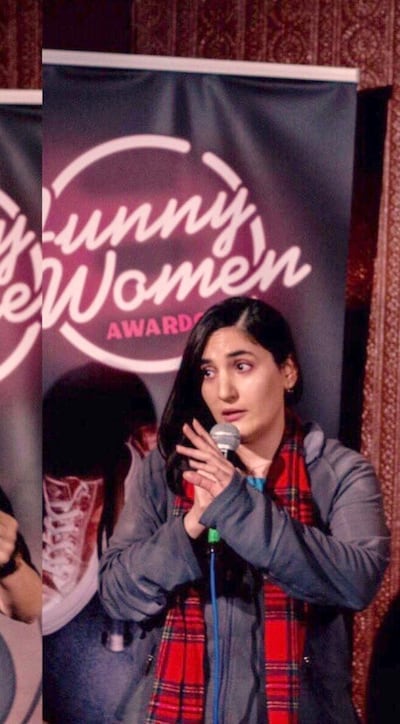Comedienne Jenan Younis has had her fair share of tough gigs, but there is one in particular she will always remember. She was in the middle of a show when three men walked in and sat in the front row.
"Three skinheads walked in, sat down and just refused to look at me while I was performing. They would not look at me at all, which was really hard. I asked them if I was making them uncomfortable. It took a lot of pushing and prodding to get them to engage," she tells The National. "Sometimes silence is worse than a heckle."
Younis, who by day is a colorectal surgeon, is one of the UK's most promising comedic talents. The winner of the 2019 BBC New Voices award, she is a regular on British radio comedy panels. Her work is centred on her identity as a British woman with Middle Eastern heritage. Her father is Palestinian and her mother is from Iraq.
Her performance on Saturday, at London's Vault, a festival of the arts, will focus on what it's like coming from a Middle Eastern background in modern-day Britain.
“It starts off as a millennial whinge about myself and how nobody sees me. I’ll be the person in a restaurant asking for the bill and the waiter will continually walk past me until the restaurant is closed. Or I’ll be at a coffee shop and four people will push in front of me.
"It's about not being seen as a person and why that is. Is it because I'm an introvert or is it not my fault? Is it society's fault? Are we living in a pseudo-woke era where everyone who's not white is a person of colour?
“Some of the stories that come from it are mixed-identity. People assume I’m Asian or Arab or Muslim and I’m not.”
Confusion over Younis’s identity is a running theme in both her everyday life and her comedy career.
However, she says she’s been told by comedy promoters, reviewers and some comedians not to talk about her heritage if she wants to progress. “There is still a lot of difficulty in digesting what’s seen as having a controversial ethnic background. I was booked for something that was advertised as a pro-diverse, pro-female event, and they had deliberately sought me out. But when I talked about my Palestinian heritage, I was told I would not be booked again,” she explains.
But Younis wants to change that. She says growing up in Surrey, she was always conscious of not bringing up her background. So comedy was an important tool for her to explore that.
“Comedy is a great medium for getting across opinions and ideas. You can do much more with comedy than all the documentaries and news pieces put together. It’s an art form for social change, although I’m not saying I’ve changed anything yet.”
She cites British-Iranian comic Omid Djalili as one of her heroes for being able to talk about tricky topics such as race and identity politics to an audience from any background laughing along with him.
“I don’t want to just end up doing ethnic nights or nights where you know the audience is on your side. I want to be able to walk into a comedy club and even get the skinheads laughing with me.”
Jenan Younis is performing her show Jenanistan (Work in Progress) at Vault festival in London on Saturday, March 14


